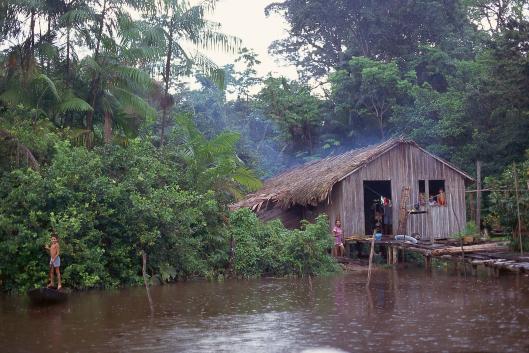The fossil fuels industry and its political and economic allies failed (once again) in their lobby offensive for governments to adopt rules for carbon trading during the last UN climate negotiations in November 2022 - despite their ever-increasing number of lobbyists present at climate summits.
And why are these actors so eager to have carbon trading as a climate policy? Because it allows the fossil fuels industry, and all the industries that depend on them, to continue expanding and possibly even profit from it. ‘Carbon markets’ are at the core of many concepts that are being promoted, including carbon offsets, ‘net zero emissions’, 'carbon-neutral' products, ‘nature-based solutions’, REDD+, ‘zero net deforestation’.
Even though the actual role of carbon markets in the UN Paris Agreement continues to be contested and debated at the UN climate summits, some governments are moving ahead regardless with establishing national or sub-national carbon market schemes, bilateral agreements or private-public partnerships to set up new carbon market initiatives. All of these, in one way or another, create demand for more carbon trading and pave the way for an even stronger dependence on carbon market schemes as the only way forward.
The government of Switzerland, for example, has established bilateral treaties with Peru, Ghana, Senegal, Georgia, Vanuatu, Dominica, Thailand, Ukraine, Morocco, Chile and Uruguay, in order to reach its target of 'net zero' emissions by 2050. These agreements establish a legal basis for commercial contracts that guarantee the transfer of (cheap) emission reduction credits, potentially leaving those southern countries to finance more expensive emission reductions to reach their own targets. (1) A carbon consultancy firm explained how these agreements are “important laboratories for the future of market mechanisms.” (2)
Moreover, US climate envoy, John Kerry, launched at the UN climate conference a voluntary carbon offset plan, with the support of Jeff Bezos’ Earth Fund (from the giant retailer Amazon company), Microsoft, PepsiCo and the Bank of America. (3)
Fossil fuel and other polluting companies, too, keep signing agreements with southern governments for the purchase of vast amounts of carbon offsets. In November 2022, Guyana’s President Irfaan Ali announced that the US-based oil company Hess Corporation would buy 2.5 million carbon offsets every year from 2016 to 2030. Hess Guyana Exploration holds 30 per cent interest in the Stabroek oil and gas exploration block off the coast of Guyana. The carbon credits are generated from REDD projects in the forests of Guyana. (4) All major oil companies are buying carbon offsets.
What governments discuss and agree (or don't agree) on during the UN climate summits is not that relevant in the real world of carbon market expansion. Companies, governments, conservation NGOs, consultancy companies, brokers, banks and many other interested players are working hard to establish carbon market schemes as the only way forward.
That's even worse considering that carbon offsets, while intensifying the climate crisis, are serving as a façade for the expansion of a violent and racist grabbing of Indigenous Peoples and peasant communities’ lands and forests.
An article in this Bulletin about four REDD projects in the municipality of Portel in Brazil, shows how community rights, in some cases even unbeknown to the community, are violated and communities’ self-determination compromised by these projects.
Another article shares a discussion round organized by WRM to reflect together with nine allies from different regions on the many and diverse layers of harmful impacts that the REDD mechanism has caused over the last 15 years.
With a focus on the Amazon region in particular, another article explains how the ‘solutions’ that are being proposed - including carbon schemes, renewable energy, agrofuels, etc. - have become new underlying causes of deforestation. These ‘green’ projects are expanding side-by side with other destructive ‘business-as-usual’ projects.
Among those destructive projects are industrial monoculture plantations. This Bulletin includes two contributions highlighting the stories and resistances of women facing oil palm plantations on their territories: one is a podcast telling the story of women in Sierra Leone confronting Socfin company’s plantations; and the second is an interview with a woman from La Red de Mujeres de La Costa en Rebeldía from Chiapas, Mexico, which emphasizes how they are confronting this monoculture facilitated by contracts that the men are signing with the companies.
And another article reflects on the ongoing plans of Indonesia’s government to construct a new capital city with the argument of making it a ‘green’ and ‘smart’ city, which would help Indonesia achieve its ‘net zero emissions’ targets. The article draws parallels to the time when Brazilian rulers decided to construct a new capital city some 60 years ago in the middle of the country.
While Indigenous Peoples, peasant and other communities, in particular in the Global South, are confronting first hand the heavy impacts of the climate crisis, UN conferences and agreements have been flooded, since the beginning, with the interests of keeping the capitalist economy running.
Let’s turn our eyes and efforts toward strengthening our solidarity and strategizing with horizontal alliances among grassroots movements. (5) The discussions need to be there, with those that are truly defending life.
(1) Swiss Confederation, Bilateral climate agreements on emission reductions and carbon storage abroad.
(2) Argus, Swiss article 6 agreements 'set poor precedent', November 2021.
(3) Reuters, U.S. climate envoy Kerry launches carbon offset plan, November 2022.
(4) REDD-Monitor, Guyana is to sell US$750 million carbon offsets to Hess Corporation, a US-based oil corporation that is extracting oil in Guyana. The saga of false solutions to the climate crisis continues, December 2022.
(5) WRM briefing, A critical reflection on participation in international forest policy processes, 2022.
